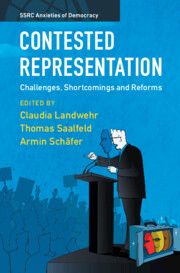Book contents
- Contested Representation
- SSRC Anxieties of Democracy
- Sponsored by the Social Science Research Council
- Contested Representation
- Copyright page
- Contents
- Figures
- Tables
- Contributors
- Acknowledgments
- 1 Introduction
- Part I The Contested Idea of Political Representation
- Part II Representation and Responsiveness in Unequal Societies
- Part III Polarization, New Cleavages, and Shifts in Democratic Government
- Part IV Constitutional Crisis and Institutional Reform
- 14 Deliberative Innovations and the (Re-)Inclusion of Disadvantaged and Underrepresented Citizens
- 15 Electoral Democracies and Democratic Innovations
- Bibliography
- Index
15 - Electoral Democracies and Democratic Innovations
from Part IV - Constitutional Crisis and Institutional Reform
Published online by Cambridge University Press: 03 November 2022
- Contested Representation
- SSRC Anxieties of Democracy
- Sponsored by the Social Science Research Council
- Contested Representation
- Copyright page
- Contents
- Figures
- Tables
- Contributors
- Acknowledgments
- 1 Introduction
- Part I The Contested Idea of Political Representation
- Part II Representation and Responsiveness in Unequal Societies
- Part III Polarization, New Cleavages, and Shifts in Democratic Government
- Part IV Constitutional Crisis and Institutional Reform
- 14 Deliberative Innovations and the (Re-)Inclusion of Disadvantaged and Underrepresented Citizens
- 15 Electoral Democracies and Democratic Innovations
- Bibliography
- Index
Summary
We live in a period of hope and fear for democracy. The fears are top of mind, with surges of authoritarian populism in most countries in Europe as well as most developed democracies, and a series of high-profile setbacks for the project of the European Union (Chapters 2 and 13). In contrast to earlier challenges, the threats to the democratic project are not so much other forms of government, but rather mismatches between the problems that peoples and societies face, and the capacities of representative democracies to address them. Where the mismatch becomes a gulf, mechanisms long associated with democratic government, particularly competitive elections, have become a vehicle for authoritarian populists to undermine other, equally necessary institutions, including those associated with the rule of law and the rights that define and empower democratic citizenship (Galston 2018; Levitsky and Ziblatt 2018; Mounk 2018; Diamond 2020). Although the patterns vary by country, in places where representative democracy has been long established we are seeing elected leaders with autocratic tendencies, using the very tools central to the democratic project to erode democratic institutions. Democracies, we fear, may be eroding precisely through the electoral institutions that have come to define them (Chapter 13).
- Type
- Chapter
- Information
- Contested RepresentationChallenges, Shortcomings and Reforms, pp. 277 - 294Publisher: Cambridge University PressPrint publication year: 2022



